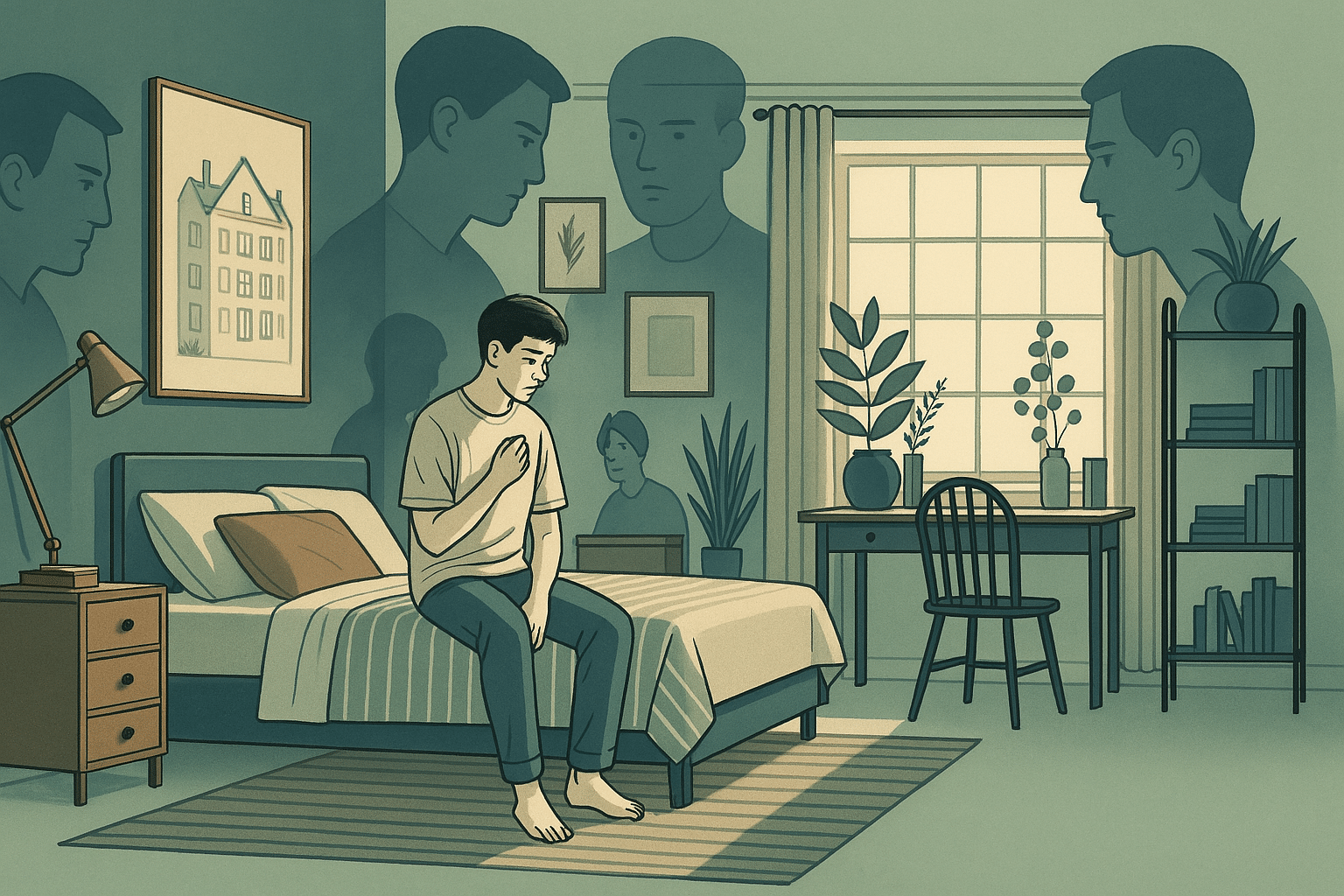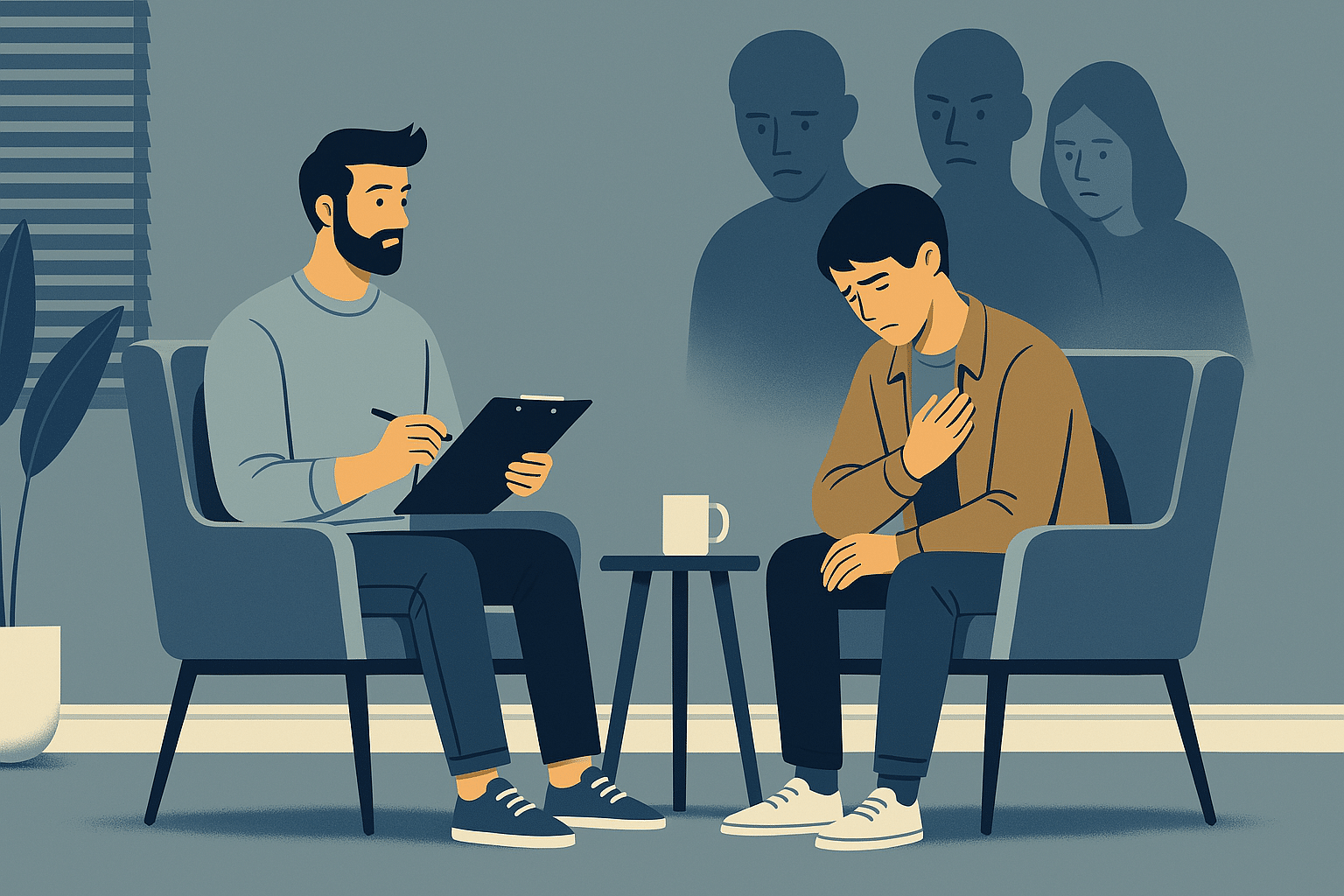Key Takeaways
- Paranoia involves intense suspicion and fear of others without evidence, while delusions are false beliefs that contradict reality despite contrary evidence.
- Identifying whether someone experiences paranoia or delusions is the most important step for effective treatment, as each requires different therapeutic approaches.
- Both conditions can stem from psychological, environmental, and biological factors, including past trauma and high-stress environments.
- Effective management typically combines therapy (such as CBT), medication, and supportive self-help techniques.
- At A Mission For Michael (AMFM) we offer specialized, accredited mental health care with evidence-based therapies and personalized treatment plans for paranoia and delusions.
Paranoia vs Delusion: Recognizing Key Differences
Paranoia is characterized by an intense and irrational distrust or suspicion of others. It can make you feel like you’re constantly being watched or that people are plotting against you. These feelings can be overwhelming and lead to isolation.
On the other hand, a delusion is a firmly held belief that contradicts reality. These beliefs can be influenced by culture or religion—and they persist even when presented with evidence to the contrary. For example, someone may believe they have a special relationship with a famous person or possess extraordinary abilities.
Why It Matters to Differentiate
Identifying whether someone is experiencing paranoia or delusions is the first step towards effective treatment, as these conditions require different therapeutic approaches. For instance, someone with paranoia may benefit from therapy focused on trust-building, while a person experiencing delusions may need cognitive-behavioral strategies to challenge their beliefs.
Understanding these differences can also help in communicating your needs more efficiently with healthcare providers. It allows for a more accurate diagnosis and unique treatment plans.
Founded in 2010, A Mission For Michael (AMFM) offers specialized mental health care across California, Minnesota, and Virginia. Our accredited facilities provide residential and outpatient programs, utilizing evidence-based therapies such as CBT, DBT, and EMDR.
Our dedicated team of licensed professionals ensures every client receives the best care possible, supported by accreditation from The Joint Commission. We are committed to safety and personalized treatment plans.
Symptoms and Characteristics
Signs of Paranoia
Paranoia can manifest in various ways, often impacting daily life and relationships. Here are some common signs:
- Persistent belief that others are trying to harm or deceive you.
- Feeling overly suspicious or mistrustful of friends and family.
- Interpreting benign comments or actions as malicious.
- Reluctance to confide in others due to fear of betrayal.
Types of Delusions
Delusions can vary greatly in content and intensity. Here are some common types:
- Persecutory Delusions: Belief that one is being targeted or harassed.
- Grandiose Delusions: Belief in having exceptional abilities or fame.
- Somatic Delusions: Belief that one’s body is diseased or abnormal.
- Erotomanic Delusions: Belief that someone, often of higher status, is in love with them.
Overlap and Differences
While paranoia and delusions can coexist, they are not the same. Paranoid delusions, for example, combine elements of both paranoia and delusion. In such cases, the individual may have delusional beliefs rooted in paranoia, such as believing they are under constant surveillance by the government.
Cognitive and Psychological Triggers

Often, these conditions arise from a combination of thought patterns and emotional responses. For example, an individual with a tendency to overanalyze situations may become paranoid if they constantly interpret others’ actions as threatening.
Similarly, delusions can stem from cognitive distortions, where an individual misinterprets reality based on flawed logic or reasoning. These distortions can be reinforced by emotional states such as anxiety or depression—which can exacerbate the intensity of delusional beliefs.
Aside from this, certain personality traits, like high levels of suspicion or low self-esteem, can also contribute to the development of paranoia or delusions. These traits can influence how individuals perceive and interpret their environment, making them more susceptible to these conditions.
Impact of Environment and Trauma
A history of traumatic experiences, such as abuse or neglect, can leave individuals feeling vulnerable and mistrustful, which makes them more prone to paranoid thoughts.
Similarly, environments characterized by high stress or conflict can exacerbate these feelings, triggering delusional thinking.
Treatment and Management Strategies
Therapy and Counseling Approaches

Therapy is often the bedrock of treatment for paranoia and delusions. Cognitive-behavioral therapy (CBT) can be particularly effective in helping individuals identify and challenge distorted thoughts.
Through CBT, individuals learn to reframe negative interpretations and develop healthier thought patterns.
Medication Options
Medication can also play a critical role in managing symptoms—antipsychotic medications are commonly prescribed to help reduce delusional thinking and paranoia.
Antidepressants or anti-anxiety medications may also be used to address underlying mood disorders that contribute to these conditions.
Support and Self-Help Techniques
Beyond professional treatment, support from family and friends can be invaluable. Encouraging open communication and understanding can help individuals feel less isolated.
Self-help techniques, such as mindfulness and stress reduction exercises, can also support mental health by promoting relaxation and emotional regulation.
Practical Tips to Identify Paranoia or Delusion
Identifying if you or someone you know is experiencing paranoia or delusions can be challenging. Here are some practical tips to help you recognize these conditions:
Example: If someone frequently expresses fear that they are being watched or followed without evidence, they may be experiencing paranoia. If, however, they insist they have special powers despite evidence to the contrary, this could indicate a delusion.
Recognizing Patterns
Look for recurring themes in conversations or actions that suggest persistent fears or beliefs that contradict reality.
Example: A person may consistently avoid social situations due to fear of being judged or harmed, indicating a pattern of paranoia. Alternatively, repeated claims of having direct communication with a deity might suggest a religious delusion.
Taking the Next Step Toward Healing
At A Mission For Michael (AMFM), we understand the profound impact that paranoia and delusions can have on your life and relationships. These conditions create distorted perceptions of reality—whether through unfounded suspicions about others or firmly held false beliefs—that can leave you feeling isolated and overwhelmed.
Our approach to treating these symptoms extends beyond simple symptom management. We recognize that effective treatment requires a comprehensive understanding of each person’s unique experience, which is why our team of licensed professionals develops personalized treatment plans utilizing evidence-based therapies like CBT, DBT, and EMDR to address the root causes of paranoia and delusions.
Since 2010, we’ve created safe, supportive environments across our accredited facilities in Southern California, Minnesota, and Virginia. Our Joint Commission accreditation reflects our commitment to the highest standards of care.

You could need the structure of residential treatment or the flexibility of outpatient programs; we’re here to guide you through every step of recovery.
Frequently Asked Questions (FAQ)
How common are paranoia and delusions?
Paranoia and delusions are relatively common symptoms in various mental health disorders including schizophrenia, bipolar disorder, and severe depression. While exact prevalence varies, these symptoms affect a significant portion of individuals with these conditions.
Can someone have both paranoia and delusions simultaneously?
Yes, it’s possible to experience both paranoia and delusions. In fact, paranoia can sometimes develop into delusional thinking.
What treatment options are most effective?
A combination of therapy and medication typically leads to the best outcomes. Cognitive-behavioral therapy (CBT) helps challenge distorted thoughts, while antipsychotic medications can reduce symptom intensity.
How do lifestyle changes impact these conditions?
Lifestyle modifications can significantly complement professional treatment. Regular exercise, balanced nutrition, proper sleep, and mindfulness practices help manage stress and anxiety that can exacerbate symptoms.
What makes AMFM unique in treating paranoia and delusions?
At A Mission For Michael (AMFM), we offer mental health care in Southern California, Minnesota, and Virginia through accredited facilities. Our well-rounded approach combines evidence-based therapies with personalized treatment plans.













